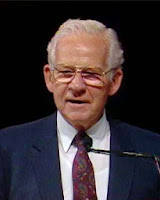"A good bishop made an interesting comment about what he called the saddest words that he knows of a man in high station. He read from the words in the days of the Apostle Paul when Paul before King Agrippa had borne his powerful testimony of his conversion. King Agrippa's reply was, 'Almost thou persuadest me to be a Christian.' (Acts 26:28.) Then the bishop said, 'The king knew the truth but he lacked the courage to do that which would be required; and he could only say then, "Almost thou persuadest," almost persuaded under certain circumstances to do the thing the Lord would want him to do.'
"And then he characterized some things that he discovered in his own ward in a short but powerful sermon. 'In response to the Master, "Come, ... follow me" (Mark 10:21), some members almost,' he said, 'but not quite, say, "thou persuadest me almost to be honest but I need extra help to pass a test"'....
"Almost thou persuadest me to keep the Sabbath day holy, but it's fun to play ball on Sunday.
"Almost thou persuadest me to love my neighbor, but he is a rascal; to be tolerant of others' views, but they are dead wrong; to be kind to sister, but she hit me first; to go home teaching but it's so cold and damp outside tonight; to pay tithes and offerings, but we do need a new color TV set; to find the owner of a lost watch, but no one returned the watch I lost; to pass the Sacrament, but I've graduated from the deacons now, almost thou persuadest me to be reverent, but I had to tell my pal about my date last night; almost thou persuadest me to attend stake leadership meeting, but I know more than the leader on that subject, so why should I go? Thou persuadest me almost to go to sacrament meeting but there is going to be such an uninteresting speaker tonight. Almost! Almost! Almost! but not quite, not able quite to reach."
- Harold B. Lee, Conference Report, April 1964, pp. 23-24; see THBL 147
President Lee's application of the classic apology from King Agrippa is thought-provoking. There are times when we almost make the right choice, almost live up to our potential. But the lack of full and total commitment holds us back. Each of us can probably find something in President Lee's list that reminds us of an area where we could be more committed, more devoted to God and His work.
I love the phrase that appears a number of times in the Book of Mormon to describe the level of devotion God asks of us: "whole soul." He doesn't want a token portion of our commitment. He wants everything.
"And now behold, I say unto you that the right way is to believe in Christ, and deny him not; and Christ is the Holy One of Israel; wherefore ye must bow down before him, and worship him with all your might, mind, and strength, and your whole soul; and if ye do this ye shall in nowise be cast out."Or this:
- 2 Nephi 25:29, emphasis added
"And now, my beloved brethren, I would that ye should come unto Christ, who is the Holy One of Israel, and partake of his salvation, and the power of his redemption. Yea, come unto him, and offer your whole souls as an offering unto him, and continue in fasting and praying, and endure to the end; and as the Lord liveth ye will be saved."It's clear that "almost" is not what the Savior asks when he invites us to follow Him!
- Omni 1:26, emphasis added

































